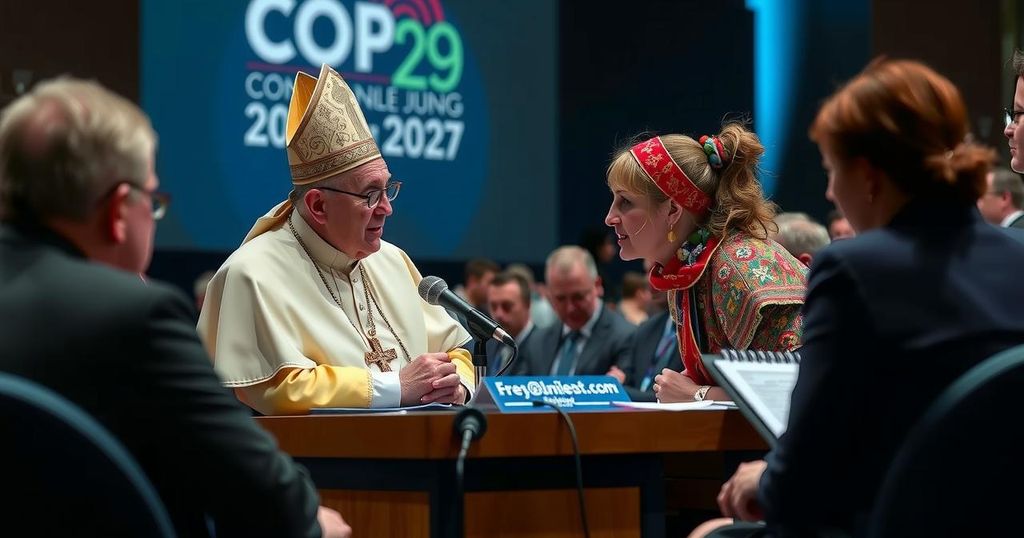The Vatican has obstructed discussions on gender rights at COP29, aligning with several conservative countries, hindering support for women facing climate change impacts. The standoff has caused concern over women’s representation and the urgency of addressing gender-related issues exacerbated by climate challenges. Advocacy groups warn that failure to negotiate effectively could reverse progress in establishing women’s rights in climate policies, emphasizing the necessity for inclusivity in the dialogue.
The ongoing COP29 climate talks in Azerbaijan have been marred by a significant controversy involving the Vatican and its allies, including Saudi Arabia, Russia, Iran, and Egypt, blocking discussions on women’s rights related to climate change. Sources reveal that these nations are preventing the inclusion of terms like “gender,” fearing it might encompass transgender issues, thus impeding much-needed support for women severely affected by climate-related challenges. Colombia’s environment minister, Susana Muhamad, emphasized the necessity of advancing the gender program, stating that the continued stalling of negotiations is “unacceptable.”
The Vatican’s position contradicts a decade of acknowledgment among nations that climate change disproportionately impacts women, particularly given their roles during crises and their unique vulnerabilities. Current UN data highlights that women and girls account for a staggering 80% of those displaced by climate change. Charities assert that failure to reach an agreement at COP29 may lead to a significant regression in the global agenda addressing women’s rights, highlighting concerns over the ever-increasing food insecurity faced by women as climate patterns worsen.
As countries’ representatives gathered to update the Lima Work Programme on Gender, the insistence on removing references to “gender” and avoiding any mention of LGBTQ+ rights stood in stark contrast to the pressing need for inclusivity in climate discussions. Advocacy groups, such as ActionAid and the Women’s Environment and Development Organization, have expressed dismay at the Vatican’s sudden change of stance, highlighting a broader global backlash against women’s rights. With only a few days remaining in the conference, the future of women’s rights in climate negotiations remains uncertain, especially considering the low representation of women in negotiation roles, which may prevent authentic representation of their realities within climate-impacted communities.
Looking toward future negotiations, the EU, supported by 17 member countries, has reinforced that addressing the climate crisis effectively necessitates an unwavering commitment to the empowerment of all women and girls. The outcome of these talks is crucial, as inaction could leave a vacuum in global strategies designed to support women facing the harsh realities of climate change.
The conflict surrounding gender rights at the COP29 climate summit has emerged amidst broader global tensions regarding women’s and LGBTQ+ rights. The Vatican, historically an influential entity in social and moral discourse, has allied with nations traditionally perceived as conservative, particularly regarding issues of gender identity and sexual orientation. This standoff poses significant challenges to the advancement of established goals intended to foster gender equality and empower women in the context of climate change, emphasizing the necessity for inclusive discourse within international negotiations. It is critical to recognize that climate change poses a heightened risk to women, amplifying existing inequalities and significantly affecting their ability to recover from environmental disasters.
As the COP29 negotiations progress, the obstruction of gender-related discussions by a coalition of conservative nations raises serious concerns about the future of women’s rights and recognition within climate policies. Attention must be given to the implications this deadlock may have on global support systems designed for women affected by climate change. Given the significant underrepresentation of female voices at the negotiating tables, it is imperative that stakeholders prioritize inclusivity and advocacy for women’s rights to ensure equitable solutions to the ongoing climate crisis. Failure to do so may undermine years of progress aimed at addressing the specific vulnerabilities faced by women in climate-impacted regions.
Original Source: www.bbc.com







